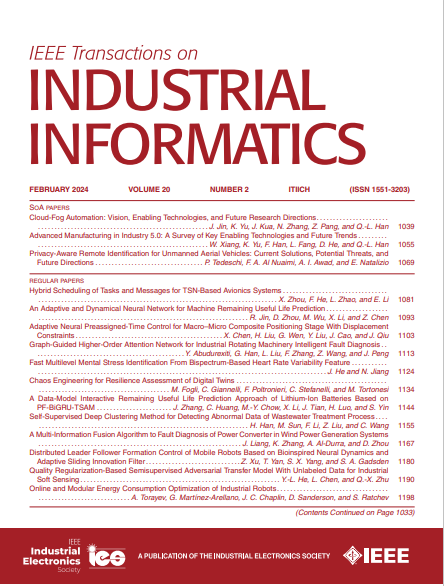Trustworthy and Reliable Deep-Learning-Based Cyberattack Detection in Industrial IoT
IF 11.7
1区 计算机科学
Q1 AUTOMATION & CONTROL SYSTEMS
引用次数: 7
Abstract
A fundamental expectation of the stakeholders from the Industrial Internet of Things (IIoT) is its trustworthiness and sustainability to avoid the loss of human lives in performing a critical task. A trustworthy IIoT-enabled network encompasses fundamental security characteristics, such as trust, privacy, security, reliability, resilience, and safety. The traditional security mechanisms and procedures are insufficient to protect these networks owing to protocol differences, limited update options, and older adaptations of the security mechanisms. As a result, these networks require novel approaches to increase trust-level and enhance security and privacy mechanisms. Therefore, in this article, we propose a novel approach to improve the trustworthiness of IIoT-enabled networks. We propose an accurate and reliable supervisory control and data acquisition (SCADA) network-based cyberattack detection in these networks. The proposed scheme combines the deep-learning-based pyramidal recurrent units (PRU) and decision tree (DT) with SCADA-based IIoT networks. We also use an ensemble-learning method to detect cyberattacks in SCADA-based IIoT networks. The nonlinear learning ability of PRU and the ensemble DT address the sensitivity of irrelevant features, allowing high detection rates. The proposed scheme is evaluated on 15 datasets generated from SCADA-based networks. The experimental results show that the proposed scheme outperforms traditional methods and machine learning-based detection approaches. The proposed scheme improves the security and associated measure of trustworthiness in IIoT-enabled networks.工业物联网中值得信赖和可靠的基于深度学习的网络攻击检测
工业物联网(IIoT)利益相关者的一个基本期望是其可信度和可持续性,以避免在执行关键任务时造成人员伤亡。值得信赖的IIoT网络包含基本的安全特性,如信任、隐私、安全、可靠性、弹性和安全性。由于协议差异、更新选项有限以及安全机制的旧版本,传统的安全机制和程序不足以保护这些网络。因此,这些网络需要新的方法来提高信任级别并增强安全和隐私机制。因此,在本文中,我们提出了一种新的方法来提高IIoT网络的可信度。我们提出了一种准确可靠的监控和数据采集(SCADA)网络网络攻击检测方法。所提出的方案将基于深度学习的金字塔递归单元(PRU)和决策树(DT)与基于SCADA的IIoT网络相结合。我们还使用集成学习方法来检测基于SCADA的IIoT网络中的网络攻击。PRU和集成DT的非线性学习能力解决了不相关特征的敏感性,允许高检测率。在基于SCADA的网络生成的15个数据集上对所提出的方案进行了评估。实验结果表明,该方案优于传统方法和基于机器学习的检测方法。所提出的方案改进了启用IIoT的网络中的安全性和相关的可信度度量。
本文章由计算机程序翻译,如有差异,请以英文原文为准。
求助全文
约1分钟内获得全文
求助全文
来源期刊

IEEE Transactions on Industrial Informatics
工程技术-工程:工业
CiteScore
24.10
自引率
8.90%
发文量
1202
审稿时长
5.1 months
期刊介绍:
The IEEE Transactions on Industrial Informatics is a multidisciplinary journal dedicated to publishing technical papers that connect theory with practical applications of informatics in industrial settings. It focuses on the utilization of information in intelligent, distributed, and agile industrial automation and control systems. The scope includes topics such as knowledge-based and AI-enhanced automation, intelligent computer control systems, flexible and collaborative manufacturing, industrial informatics in software-defined vehicles and robotics, computer vision, industrial cyber-physical and industrial IoT systems, real-time and networked embedded systems, security in industrial processes, industrial communications, systems interoperability, and human-machine interaction.
 求助内容:
求助内容: 应助结果提醒方式:
应助结果提醒方式:


